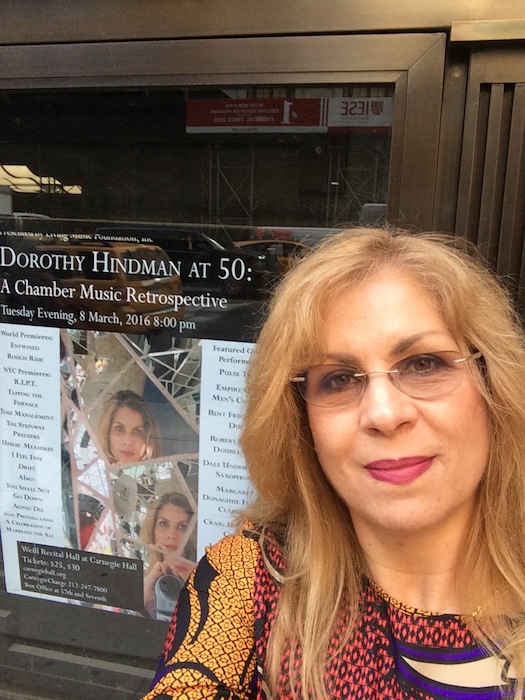Dorothy Hindman’s range of expression on display in retrospective
Composer Dorothy Hindman celebrated her 50th birthday Tuesday night with a musical party, and large-scale retrospective of her chamber music at Weill Recital Hall.
What came through in the 11 works was that Hindman, who teaches at the Frost Music School at the University of Miami, doesn’t have an overriding style in the conventional sense. Instead, she uses elements of some contemporary compositional styles, applying them as needed to realize her ideas.
As an example, she generates the overtones to particular pitches, as the spectralists do, but she doesn’t make music that fits easily into the common spectral forms. She’ll also base a piece off of a track of popular music, but the results are nothing like indie-classical.
This gives her work a nice expressive flexibility, which is ideal for an artist like Hindman who keeps her intentions, and her heart, upfront.
The concert mixed together both programmatic and absolute music. Her most successful pieces had a satisfying sensation of witnessing a solution build itself in real time. When things didn’t work—and the concert was inconsistent—there was irresolution.
The selections spanned approximately the last 20 years and there were a plethora of musicians and ensembles. All the performers were clearly dedicated to, and energized by, her music.
Hindman’s program music captured contemporary concerns and used some of the media fabric of everyday life. Two of the strongest pieces were R.I.P.T. and Rough Ride; the former a response to violent deaths of young black men, the latter (the newest work) specifically about the death of Freddie Gray at the hands of the police.
R.I.P.T was played by the Bent Frequency Duo Project— saxophonist Jan Berry Baker and percussionist Stuart Gerber—who delivered a sharp performance. The foundation of the piece is the hip hop track “Beef,” from L’il Reese, the song that started a 2012 argument in Florida that ended up with Michael David Dunn shooting teenager Jordan Russell Davis. Hindman adapted the rhythms and used the lyrics as spoken words for the musicians, as well as to create instrumental phrases. She derived harmonic materials from the song, in the manner of spectral music.
Hindman made Rough Ride, played with impressive poise and sensitivity by cellist Craig Hultgren, in similar fashion, using bystander video from Gray’s arrest for both spoken words and pitch sources. Rough Ride is more abstract and more powerful, the cello line shining and abrading, like fiberglass threads, the fragmented text outlining a sense of tragedy.
If spectralism is one of Hindman’s important techniques, the other is post-minimalist repetition. The best example of that was Drift, played by the Frost Saxophone Quartet. Although the soprano sax is mysteriously underutilized, the music and playing were bright with energy and a lilting lyricism.
Another lyrical and successful work was Heroic Measures, a sympathetic lament on illness and dignified death. Played by PULSE (violinist Scott Flavin, clarinetist Margaret Donaghue Flavin, and pianist Naoko Takao), the music is a simple but plangent series of rising and falling phrases, with notes spinning out into the air, modeled after the simple act of breathing.
Other pieces were caught between techniques and goals. The solo bass piece Time Management tried to express the search for stillness and order within an over-scheduled life. Even though Robert Black played with exceptional command, the music doesn’t reconcile its own fragments into a conciliatory order.
I Feel Fine, for solo guitar (played by Paul Bowman), and Entwined, played by Donaghue Flavin and saxophonist Dale Underwood, likewise were unsettled between the demands of spectralism and repetition. The former requires sufficient duration for the harmonies and overtones to expand, the process of the latter is all about moment-to-moment change. Gerber played the virtuosic percussion solo Tapping the Furnace, a combination of vocal narrative and scintillating sounds and rhythms, a high point of both the concert and Hindman’s oeuvre.
The most satisfying music making came through the composer’s son, 17-year old Jacob Mason, who played her Steinway Preludes. Those five short pieces in the manner of Debussy have exquisite craft, and Mason’s playing was exceptional, with dazzling fingerwork and an ear for phrasing.
At the end of an almost three-hour evening came two vocal pieces, You Shall Not Go Down, and Agnus Dei—from Prothalamia: A Celebration of Marriage for All. The quality of the music was difficult to judge, because unfortunately these were the only poor performances of the night. Vince Peterson led members of the Empire City Men’s Chorus in rough ensemble and shaky intonation that created effects that did not serve the music well.



